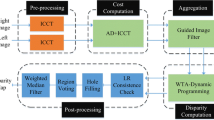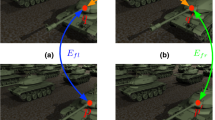Abstract
There have been many progresses in the stereo matching problem. However, some remaining problems still make stereo matching difficult. Occlusion is one of such problems. In this paper, we propose a new stereo matching model that addresses this problem by using an effective visibility constraint. By considering two images simultaneously, complex geometric configurations regarding the visibility of a pixel becomes simplified, so that the visibility constraint can be modeled as a pairwise MRF. Also since the proposed model enforces the consistency between two disparity maps, the final results become consistent with each other. Belief propagation is employed for the solution of the modeled pairwise MRF. Experimental results on the standard data set demonstrate the effectiveness of our approach.
Preview
Unable to display preview. Download preview PDF.
Similar content being viewed by others
References
Sun, J., Li, Y., Kang, S.B., Shum, H.Y.: Symmetric stereo matching for occlusion handling. In: CVPR 2005, vol. II, pp. 399–406 (2005)
Wei, Y., Quan, L.: Asymmetrical occlusion handling using graph cut for multi-view stereo. In: CVPR 2005, vol. II, pp. 902–909 (2005)
Williams, O., Isard, M., MacCormick, J.: Estimating disparity and occlusions in stereo video sequences. In: CVPR 2005, vol. II, pp. 250–257 (2005)
Marr, D., Poggio, T.A.: Cooperative computation of stereo disparity. Science 194, 283–287 (1976)
Zitnick, C.L., Kanade, T.: A cooperative algorithm for stereo matching and occlusion detection. PAMI 22, 675–684 (2000)
Kolmogorov, V., Zabih, R.: Computing visual correspondence with occlusions via graph cuts. In: CVPR 2004, vol. I, pp. 261–268 (2004)
Ogale, A.S., Aloimonos, Y.: Stereo correspondence with slanted surface: critical implication of horizontal slant. In: CVPR 2004, vol. I, pp. 568–573 (2004)
Boykov, Y., Veksler, O., Zabih, R.: Fast approximate energy minimization via graph cuts. PAMI 23, 1222–1239 (2001)
Kolmogorov, V., Zabih, R.: Multi-camera scene reconstruction via graph cuts. In: Heyden, A., Sparr, G., Nielsen, M., Johansen, P. (eds.) ECCV 2002. LNCS, vol. 2352, pp. 82–96. Springer, Heidelberg (2002)
Hong, L., Chen, G.: Segment-based stereo matching using graph cuts. In: CVPR 2004, vol. I, pp. 74–81 (2004)
Sun, J., Zheng, N., Shum, H.: Stereo matching using belief propagation. PAMI 25, 787–800 (2003)
Kolmogorov, V., Zabih, R.: What energy functions can be minimized via graph cuts. PAMI 26, 147–159 (2004)
Weiss, Y., Freeman, W.T.: On the optimality of solutions of the max-product belief propagation algorithm in arbitrary graphs. IEEE Transactions on Information Theory 47, 723–735 (2001)
Birchfield, S., Tomasi, C.: A pixel dissimilarity measure that is insensitive to image sampling. PAMI 20, 401–406 (1998)
Felzenszwalb, P.R., Huttenlocher, D.P.: Efficient belief propagation for early vision. In: CVPR 2004, vol. I, pp. 261–268 (2004)
Geman, S., Geman, D.: Stochastic relaxation, gibbs distributions, and the bayesian restoration of images. PAMI 6, 721–741 (1984)
Greig, D., Porteous, B., Seheult, A.: Exact maximum a posteriori estimation for binary images. Journal of the Royal Statistical Society 51, 271–279 (1989)
Ishikawa, H.: Exact optimization for markov random fields with convex priors. PAMI 25, 1333–1336 (2003)
Pearl, J. (ed.): Probabilistic reasoning in intelligent systems: networks of plausible inference. Morgan Kaufmann Publishers Inc., San Francisco (1988)
Yedidia, J.S., Freeman, W.T., Weiss, Y.: Generalized belief propagation. In: Advances in Neural Information Processing Systems, pp. 689–695 (2000)
Tappen, F., Freeman, W.T.: Comparison of graph cuts with belief propagation for stereo, using identical mrf parameters. In: ICCV 2003, vol. II, pp. 900–906 (2003)
Comaniciu, D., Meer, P.: Mean shift: A robust approach toward feature space analysis. PAMI 23, 603–619 (2001)
Scharstein, D., Szeliski, R.: A taxonomy and evaluation of dense two-frame stereo correspondence algorithms. IJCV 47, 7–42 (2002)
Deng, Y., Yang, Q., Lin, X., Tang, X.: A symmetric patch-based correspondence model for occlusion handling. In: ICCV 2005 (2005)
Lin, M., Tomasi, C.: Surfaces with oclusions from layered stereo. PAMI 26, 1073–1078 (2004)
Author information
Authors and Affiliations
Editor information
Editors and Affiliations
Rights and permissions
Copyright information
© 2006 Springer-Verlag Berlin Heidelberg
About this paper
Cite this paper
Chang, J.Y., Lee, K.M., Lee, S.U. (2006). A New Stereo Matching Model Using Visibility Constraint Based on Disparity Consistency. In: Blanc-Talon, J., Philips, W., Popescu, D., Scheunders, P. (eds) Advanced Concepts for Intelligent Vision Systems. ACIVS 2006. Lecture Notes in Computer Science, vol 4179. Springer, Berlin, Heidelberg. https://doi.org/10.1007/11864349_55
Download citation
DOI: https://doi.org/10.1007/11864349_55
Publisher Name: Springer, Berlin, Heidelberg
Print ISBN: 978-3-540-44630-9
Online ISBN: 978-3-540-44632-3
eBook Packages: Computer ScienceComputer Science (R0)




